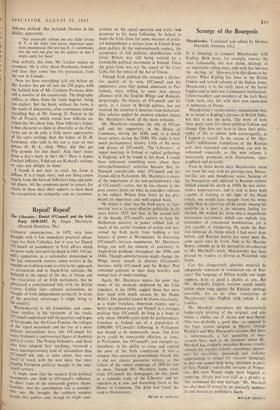Scourge of the Bourgeois
IT is tempting to • compare Mayakovsky with Kipling. Both poets, for example, express the once fashionable, but now dated, ideology of an imperialist ruling class, and each has become the darling of bliss-was-it-in-that-dawn-to-be- alivers. What Kipling has been to the British Empire and retired colonels of the Indian Army, Mayakovsky is to the early years of the Soviet Empire and to inter-war Communist intellectuals, fellow-travellers and members of the Left Book Club—now, alas, left with their own equivalent of memories of Poona.
Mayakovsky's revolutionary romanticism may be as dated as Kipling's pictures of British India, but that is not the point. The work of both these poets soars far above political fashion and change.. One does not have to share their philo- sophy of life to admire both extravagantly, as 1 happen to myself. So the reissue of Mr. Mar- shall's well-known translations of the Russian poet, here expanded and extended, can only be welcomed—especially as this new volume is luxuriously produced with, illustrations, typo- graphical and pictorial.
Even in those heroic days Mayakovsky stood out from the ruck 'with his piercing eyes, Musso- lini-like jaw and thunderous voice. Scourge of the bourgeoisie and addicted to Russian roulette (which caused his death in 1930), he was never- theless hypersensitive, and is said to have been capable of fainting at the sight of the blood which, one would have thought from his verse, might flow in rivers for all he cared. Among his qualities as a poet is an uncanny feeling for rhythm. He welded his verse into a magnificent percussion instrument, which can explode into crescendos of syncopated bombination, yet is also capable of whispering. He made the Rus- sian language do things which it had never done before, and Russian poetry has never been the same again since he wrote. And, as Sir Maurice Bowra reminds us in his perceptive introduction• to Mr. Marshall's work, Mayakovsky has been praised by readers as diverse as Pasternak and Stalin.
Can this clangorously glorious material be adequately conveyed in translation out of Rus- sian? The language of Milton would, one might suppose, have as good a chance as any. But Mr. Marshall's English versions sound unduly dulcet when rung against the Russian--perhaps inevitably, for so do other translations of Mayakovsky into English with which I am familiar.
Mr. Marshall reproduces the characteristic ladder-style printing of the original, and also makes a similar use of rhyme and near-rhyme. This was probably a good idea—as opposed to the freer system adopted in Messrs. George Reavey's and Max Hayward's versions. But there is, unfortunately, a fair sprinkling of inac- curacies here, such as the instances where Mr. Marshall has evidently mistaken Russian krushit (smash) for kruchig (whirl); otyavlenny (notori- out) for ottavlenny (poisoned) and veshchin (appertaining to things) for visyachy (hanging), so that one cannot help being reminded in parts ot• Ezra Pound's remarkable versions of Proper- ties. But even Pound might have boggled at rendering zhirafn pod rost (tall as a giraffe) as that command his new heritage.' Mr. Marshall has also been ill served by an unusually bombas- tic and inaccurate publisher's blurb.
RONALD HINGLEY






























 Previous page
Previous page